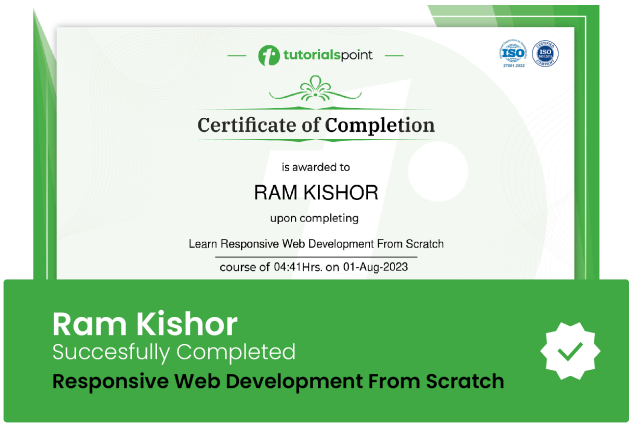Operating system concepts-3
Master the basics of Operating System memory management, virtual memory, page replacement, thrashing from scratch.

Lectures -51
Duration -3.5 hours

30-days Money-Back Guarantee
Get your team access to 10000+ top Tutorials Point courses anytime, anywhere.
Course Description
Ace operating systems (OS) memory management, paging, virtual memory, page replacement, thrashing, working set questions in competitive exams, job interviews, and OS course exams.
Do you know: How the OS presents an illusion of infinite memory to users? How can the OS execute processes much bigger than the RAM (main memory)? Where do memory addresses come from? How does OS keep several processes inside the RAM for execution? How OS makes room for new processes when the RAM is full? What happens if there are too many processes in the RAM? Learn the explanations to these and many more intriguing questions in this course!
Specifically, the course will cover the following in detail.
Memory management terminology
Where do memory addresses come from?
What are the required memory management properties?
What are some simple memory allocation schemes?
What is fragmentation?
What is internal fragmentation?
What is external fragmentation?
What is paging?
What is the key idea behind paging?
How paging works?
How is address translation done with paging?
How does paging hardware work?
How is memory address translated by the paging hardware?
How do memory management systems perform address translation without division?
How to make paging efficient?
What is TLB cache?
How does TLB cache work?
What are the performance implications of a TLB cache?
How is the main memory initialized when a process is started?
How context switches are performed in presence of paging?
How does paging facilitate memory sharing?
What is demand paging?
How does demand paging work?
When to load a page in demand paging?
How is demand paging implemented?
What is swap space?
What are the performance implications of demand paging?
How is TLB cache updated with demand paging?
What are page replacement algorithms?
What is FIFO page replacement?
What is MIN page replacement?
What is Random page replacement?
What is LRU page replacement?
What is Belady's anomaly?
What is thrashing?
How to limit thrashing?
What is working set?
Who this course is for:
- Anyone interested in learning about operating systems in modern computers could benefit from this course.
- Computer science undergraduate students taking an operating systems course could benefit from the course.
Goals
What will you learn in this course:
What you will learn:
Memory management terminology
Where do memory addresses come from?
What are the required memory management properties?
What are some simple memory allocation schemes?
What is fragmentation? (Internal, external fragmentation.)
What is paging?
What is the key idea behind paging?
How paging works?
How is address translation done with paging?
How does paging hardware work?
How is memory address translated by the paging hardware?
How do memory management systems perform address translation without division?
How to make paging efficient?
What is TLB cache?
How does TLB cache work?
What are the performance implications of a TLB cache?
How is the main memory initialized when a process is started?
How context switches are performed in presence of paging?
How does paging facilitate memory sharing?
What is demand paging?
How does demand paging work?
When to load a page in demand paging?
How is demand paging implemented?
What is swap space?
What are the performance implications of demand paging?
How is TLB cache updated with demand paging?
What are page replacement algorithms?
What is FIFO page replacement?
What is MIN page replacement?
What is Random page replacement?
What is LRU page replacement?
What is Belady's anomaly?
What is thrashing?
How to limit thrashing?
What is working set?
Prerequisites
What are the prerequisites for this course?
- No previous knowledge about operating systems is needed. Everything you need to know about the topics will be covered.

Curriculum
Check out the detailed breakdown of what’s inside the course
Introduction
7 Lectures
-
Course introduction 01:36 01:36
-
Memory management terminology 06:52 06:52
-
Where do addresses come from? 05:24 05:24
-
Required memory management properties 02:22 02:22
-
Simple memory allocation schemes 03:59 03:59
-
Memory allocation and fragmentation 05:08 05:08
-
Fragmentation heuristics 01:32 01:32
Paging
8 Lectures

Address translation
3 Lectures

How to make paging efficient?
5 Lectures

Processes and paging
3 Lectures

Demand paging
9 Lectures

Page replacement algorithms
7 Lectures

Unusual scenarios for page replacement algorithms
4 Lectures

Thrashing
5 Lectures

Instructor Details

Aditya Mishra
Hi, my name is Dr. Aditya Mishra--the founding director of Wisdom Academy. I hold a Master's degree from the Indian Institute of Technology Bombay and a Ph.D. from the University of Massachusetts, Amherst. I have a unique blend of experience working in both industry and academia.
As a scientist, I am fascinated by the ability of computer systems to make this world a better place. I have extensively researched smart grids and cyber-physical systems to achieve sustainability. Over the last decade, I have published dozens of research papers and have been cited in thousands of peer-reviewed research articles.
At the core, I am a teacher who wants to simplify Computer Science and Professional formation for aspirants like you. I have 7+ years of extensive experience teaching technical courses to undergraduate and graduate students in science and engineering disciplines. I have advised hundreds of students in their curriculum planning during this time. I have led many research and engineering projects focusing on students' technical and professional development.
And here I am! Wisdom Academy is here to help professionals, academics, and executives like you who believe it's the right time to turn their dreams into real life. This is no coincidence. I have thoroughly researched computer science, professional formation, and eastern philosophy for years before putting it all together into these courses. I invite you to join me on this journey.
Wisdom scholarships. If you are interested in taking one of our courses but cannot purchase it, you can apply for a scholarship to enroll. Learn more about the application process at my website.
May the force be with you!
Course Certificate
Use your certificate to make a career change or to advance in your current career.

Our students work
with the Best


































Related Video Courses
View MoreAnnual Membership
Become a valued member of Tutorials Point and enjoy unlimited access to our vast library of top-rated Video Courses
Subscribe now
Online Certifications
Master prominent technologies at full length and become a valued certified professional.
Explore Now


 Updated on Apr, 2024
Updated on Apr, 2024
 Language - English
Language - English